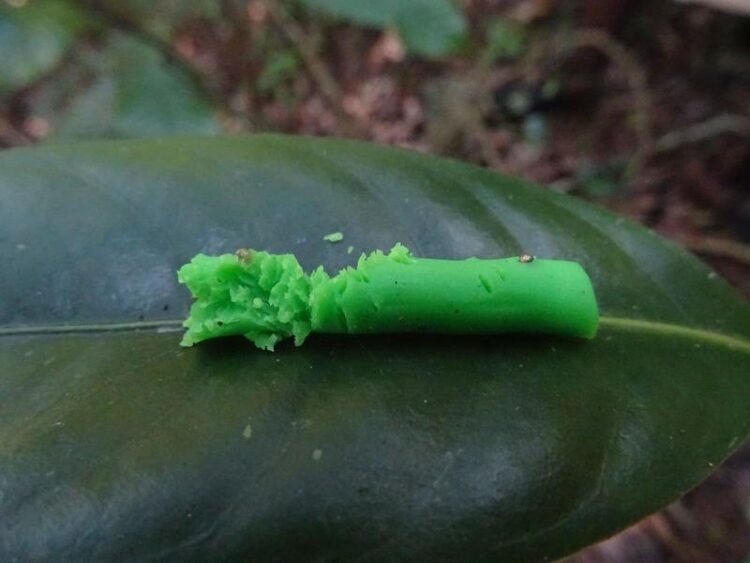Vanilla cultivation under trees promotes pest regulation

A plasticine caterpillar is used to measure the attacks from predators.
Credit: Dominik Schwab
Research team led by University of Göttingen investigates agroforestry systems in Madagascar.
The cultivation of vanilla in Madagascar provides a good income for small-holder farmers, but without trees and bushes the plantations can lack biodiversity. Agricultural ecologists from the University of Göttingen, in cooperation with colleagues from the University in Antananarivo (Madagascar), have investigated the interaction between prey and their predators in these cultivated areas. To do this, they experimentally released dummy prey in order to determine the activity of the natural enemies. The result: more prey were attacked as the proportion of trees increased. This pest control is advantageous for agricultural cultivation. The results of the study have been published in the Journal of Applied Ecology.
Vanilla is the most important crop in northwest Madagascar and is sometimes grown together with shade-providing trees in agroforestry systems. The researchers distributed standardised plasticine models of caterpillars in various habitats such as forests, fallow land, vanilla plantations and rice fields. By analysing the bite marks, they were able to analyse the predator attention on these dummy “plant-eaters”, i.e. how many predators attacked the prey. The team showed that the predator attention was highest both in the rainforest and in forest fragments, but decreased the fewer trees there were in the area. Even when comparing the landscapes, less dense forest areas had lost a large proportion of their predators. Ants and grasshoppers also played a much greater role as predators than birds or other vertebrates, although the community in the forest differed markedly from the community on cultivated areas. This was also the case in vanilla plantations established directly under the canopies of natural forests.
Dominik Schwab, who produced these results as part of his master’s thesis, emphasises: “If rich vegetation with numerous trees is encouraged or restored in the vanilla plantations, it can contribute to nature conservation outside the forests and also promote much better pest control.” Co-author and PhD student Annemarie Wurz adds: “Such measures would not reduce the yield, as studies in coffee and cacao agroforestry showed.” Professor Teja Tscharntke, head of Agroecology at the University of Göttingen and co-author of the study, says: “The study does not only focus on diversity, but also on an important ecological function of the species involved. In doing so, it supports the United Nations’ line, which calls for a decade of ecosystem restoration from 2021 to 2030.”
###
Original publication:
Dominik Schwab, Annemarie Wurz et al.: Decreasing predation rates and shifting predator compositions along a land-use gradient in Madagascar’s vanilla landscapes. Journal of Applied Ecology (2020).
Doi: 10.1111/1365-2664.13766
Paper also available at:
https:/
Contact:
Annemarie Wurz
University of Göttingen
Faculty of Agricultural Sciences, Agroecology Group
Grisebachstraße 6, 37077 Göttingen, Germany
Tel: +49 (0)551 3933739
Email: annemarie.wurz@uni-goettingen.de
https:/
Professor Teja Tscharntke
University of Göttingen
Faculty of Agricultural Sciences, Agroecology Group
Grisebachstraße 6, 37077 Göttingen, Germany
Tel: +49 (0)551 39 9209
Email: ttschar@gwdg.de
http://www.
All latest news from the category: Agricultural and Forestry Science
Newest articles

Hyperspectral imaging lidar system achieves remote plastic identification
New technology could remotely identify various types of plastics, offering a valuable tool for future monitoring and analysis of oceanic plastic pollution. Researchers have developed a new hyperspectral Raman imaging…

SwRI awarded $26 million to develop NOAA magnetometers
SW-MAG data will help NOAA predict, mitigate the effects of space weather. NASA and the National Oceanic and Atmospheric Administration (NOAA) recently awarded Southwest Research Institute a $26 million contract…

Protein that helps cancer cells dodge CAR T cell therapy
Discovery could lead to new treatments for blood cancer patients currently facing limited options. Scientists at City of Hope®, one of the largest and most advanced cancer research and treatment…



